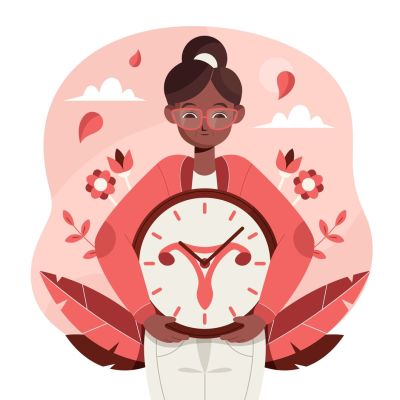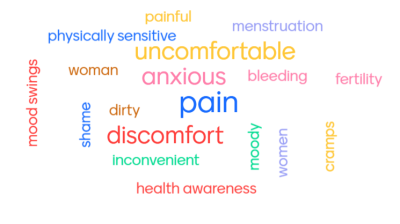
We really got into the nitty-gritty of what happens during our cycles and how it can throw us for a loop, both physically and mentally, but also how we can harness these loops for our benefits! Here’s the lowdown on what we learned and what really resonated with us:
Syncing Work With Your Cycle
Did you know that each of the 4 stages of our menstrual cycle makes us more adept at different types of tasks? Learning how to line up our work tasks with the ebb and flow of our cycle and planning your month around when you’re most energetic or needing a bit more downtime to focus can be so helpful! Let’s cut ourselves some slack and use our cycle phases to boost our workflow and keep our mental health in check. Focusing on what we eat can support us even more if we adapt our eating to what our body needs in each stage. Our cycle is a powerhouse, so let’s harness its strength in our day-to-day lives!
What’s Common vs. What’s Normal
We dove into some real talk about common symptoms like severe pain, heavy flow, depression, and anxiety that, while frequent, are not normal. As our period is also our 5th vital sign, it is a report card of our health.
Having symptoms that are not normal can be due to not eating right and getting the nutrition you need, having high levels of stress, not giving your body enough sleep, and having been sick. If you have more severe symptoms, they can be an indication of an underlying condition. Learning that these symptoms could point to conditions like polycystic ovary syndrome (PCOS), premenstrual dysphoric disorder (PMDD), premenstrual exacerbation (PME), or endometriosis was a big “aha” moment for many. We also talked about how birth control can play a big role in all this, tweaking symptoms and sometimes masking underlying issues.
 Some of the participants added some words that they associate with menstruation to our joined word cloud. Many chose the words pain and discomfort. Remember that these should not be something you should “have to deal with”, and it is not “just part of being a woman”.
Some of the participants added some words that they associate with menstruation to our joined word cloud. Many chose the words pain and discomfort. Remember that these should not be something you should “have to deal with”, and it is not “just part of being a woman”.
Check In With Your Doctor
Our conversation shed some light on the importance of keeping track of your cycle’s timing. If your period is playing hopscotch, jumping shorter than 21 days or stretching beyond 35, it is important to check in with a healthcare professional. Many factors, such as stress, your overall health, and your choice of birth control, can mess with the regularity of your cycle. Don’t forget the importance of advocating for yourself when seeing your doctor or gynaecologist, as unfortunately, if you’re dealing with any of the previously mentioned conditions, it can sometimes take years to be properly diagnosed – due to many practitioners not being sufficiently educated about women’s reproductive health.
Reusable Period Products
We got really excited about exploring all the reusable options out there – such as cups, discs, pads, panties, and even sponges. Many of you had never heard of these options, so it was great to be introduced to them! And guess what? They’re all up for grabs right here in South Africa, either in some selected stores or just a click away online. It’s all about finding what works for you. It’s better for your wallet, your comfort, and it doesn’t hurt that it may even be saving the planet while you’re at it.
Keeping The Conversation Open
Wrapping up our chat on menstrual hygiene, it’s clear there’s so much more to talk about, especially with how closely it’s linked to our mental well-being. We are hoping this conversation has helped break some of the taboos you’ve might have encountered, and encourage you too to keep on kicking the paradigm when it comes to menstruation. It’s natural and part of our lives, so let’s get better at embracing it!
Let’s keep this conversation alive and make sure we’re all feeling supported and in the know. And make sure to have a talk with your colleagues about it as well, maybe they missed the article or webinar? Here’s to understanding our bodies better and taking good care of our mental and menstrual health!
*Email Camilla for access to the video recording and PowerPoint presentation.
